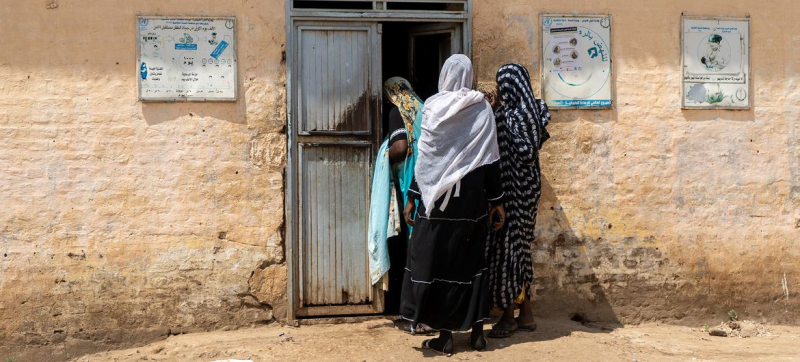- Walton Unveils Bangladesh’s Largest Floating Solar Plant |
- Dreams of July Martyrs remain unfulfilled, claim families |
- Metro Rail Halted on Agargaon–Motijheel Section After Fatal Accident |
- Dhaka’s Per Capita Income Rises to USD 5,163 |
- DSE turnover dips 18% despite weekly gains in key indices |
Giving Birth Amid Sudan’s War Strains Health Services

Women arrive at the Kosti Maternity Hospital.
As Sudan’s destructive war — now in its third year — continues, the challenges to health systems are immense, and women giving birth have been particularly affected.
In the heart of Sudan’s White Nile State, south of the capital Khartoum, Kosti Maternity Hospital handles thousands of deliveries each year. However, the ongoing war, the destruction of regional infrastructure, and the displacement of millions of people, many of them women, have placed huge strain on its services.
A changing landscape of care
Midwife Fatma Aldoma has been a pillar of Kosti Maternity Hospital since 1974 and has recently seen a tide of patients affected by the country’s insecurity.
Many of her clients have been displaced by war, and Ms. Aldoma has also witnessed patients endure the economic fallout of the conflict.
"Some women come without money. We pay out of our pockets to help them with childbirth costs,” Ms. Aldoma revealed.
Her wish is that the hospital could receive more support for supplies and resources to help women with tests and treatment.
The care Ms. Aldoma provides is making an enormous difference.
“I am happy about the services provided here and the care from the midwives,” said Faj, a 25-year-old mother of five from Tawila in the troubled Darfur region.
All her children have been born healthy at Kosti Maternity Hospital, including one with serious complications. "My biggest problem was the bleeding, but thanks to the medical care at the hospital, they helped me."
Strained systems, urgent needs
The UN estimates that 11.7 million people have been displaced due to the outbreak of conflict in Sudan in April 2023, with over four million fleeing to neighbouring countries.
Tens of thousands have reportedly died, and hundreds of thousands face famine.
Sudan was already hosting large populations of displaced people before this new emergency, who require water, food, shelter, health care, and core relief items.
Increased demand for services due to the influx of families fleeing conflict, persistent electricity outages—especially during critical surgeries like Caesarean sections—and severe shortages of medical equipment and supplies threaten to unravel the fragile care offered in places like Kosti Maternity Hospital.
UNFPA has stepped in to support the hospital with essential medical supplies, including an anaesthetic machine, incubators, oxygen concentrators, manual breathing equipment, and an ultrasound unit.
Capacity boost
These supplies have strengthened the hospital's capacity to provide life-saving maternal and newborn health services, including reducing delays in emergency surgeries and saving the lives of premature babies.
UNFPA’s installation of a solar power system at the hospital has also provided a much-needed alternative energy source, keeping essential services running.
Still, the hospital relies on generators to bridge the gap, underscoring an urgent need for investment in stronger infrastructure and resources.
Despite these challenges, aid agencies are facing severe humanitarian funding shortfalls. With only three months remaining in 2025, UNFPA’s $145.7 million appeal for Sudan is just 33 per cent funded.
UNFPA and partners have reached more than 586,000 people in Sudan with essential services, including maternal and emergency obstetric care, between January and August 2025. However, the scale of needs far exceeds available resources.

